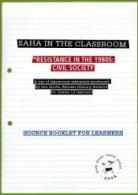The release of a new series of primary source-based history booklets is the focus of an exciting new educational project called ‘SAHA in the Classroom’. They feature nine sets of source booklets for learners, with corresponding guide booklets for educators. The aim of the project, made possible through the generous funding of the Rosa Luxembourg Foundation (RLF), is to facilitate the implementation of a source-based approach to history education. The booklets, which are freely available from the South African History Archive website, are themed around events that changed and shaped South African society during the 1980s. These include political, social and economic historical sources from this era.
The first booklet looks at Botha’s ill-fated 1983 Constitution, and is followed up with a workbook looking at the United Democratic Front (UDF) and the National Forum, which emerged in opposition to these reforms. The third and fourth booklets deal with both formal and covert repression by the South African apartheid state in the 1980s, respectively. These are balanced out with three booklets looking specifically at resistance in the 1980s – highlighting civil society, militancy and international pressure as the basis for opposition. Finally, two workbooks are devoted to the South Africa’s post-apartheid interregnum period, which saw a slow, and often shaky, move to democracy. The themes for these two booklets look at the role of violence in holding back democracy, as well as the negotiations which led up to South Africa’s first democratic election on 27 April 1994.
SAHA in the Classroom was first conceived after the Department of Education (DOE) introduced changes in history education, namely, the switch to Outcomes-Based Education, a revision of the curriculum such that more focus was placed on the period between 1976 and 1994, and the commencement of a National History Examination in 2003 based on a study of primary sources. The value of the booklets lies in their relevance to syllabus, but also in their flexibility.
The scope of the SAHA in the Classroom project does not stop there. Acknowledging the pressure placed on educators to revise their teaching methodologies and incorporate new syllabus, especially under conditions where many schools are understaffed and under-resourced, SAHA has been working with the DOE to design a workshop specifically geared towards supporting educators in using primary sources in the classroom. The pilot workshop took place on 10 October at the Old Fort seminar room at Constitution Hill, and several more are lined up for 2010.
It is hoped that exposure to a range of sources from the archives – including political cartoons, pamphlets, documents, transcribed excerpts from Truth and Reconciliation (TRC) hearings, and posters – will encourage a new level of engagement with South Africa's recent past by educators and learners alike.
Find out more about SAHA in the Classroom







